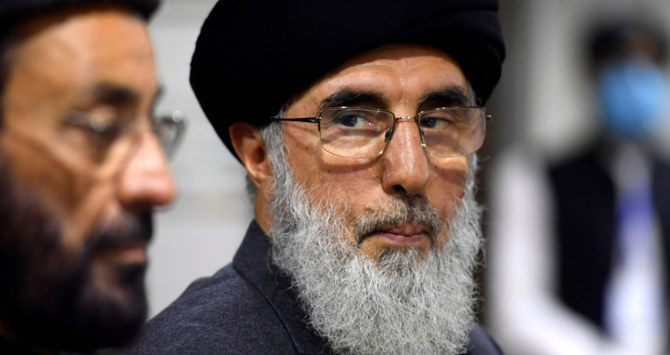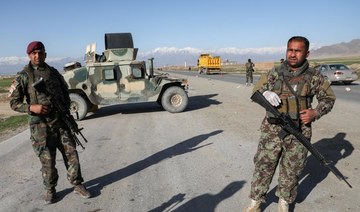KABUL: The Afghan government opposes any separate negotiations outside of its own with the Taliban, a spokeswoman for the Peace Ministry said on Thursday, after a former prime minister announced his intention of starting talks with the group to help bring peace to the war-torn country.
Speaking at a think-tank in Islamabad during his visit to Pakistan on Wednesday, Hizb-e-Islami chief Gulbuddin Hekmatyar — a former warlord who fought against the Soviet invasion of Afghanistan in the 1980s and later served as the country’s prime minister — said he had decided to start his own negotiations with the Taliban. The statement came as peace talks between the Kabul government and the group, which have been underway in Doha, Qatar since September, appear to have made no headway.
Intra-Afghan talks began on Sept. 12 after a US-Taliban peace deal was signed in late February. Under the agreement, the US committed to withdraw all foreign forces from Afghanistan by next year’s spring. In return, the Taliban promised to seek reconciliation with the Afghan government.
“Peace is a national process. The government has presented vivid mechanisms for participation of all political and social strata,” Najia Anwari, the spokeswoman for the Afghan Ministry of Peace, one of the key institutions handling the peace process, told Arab News.
“Similarly, the current government delegation is inclusive. The government’s responsible behavior with this national process leaves no room for individual approach,” she said.
An official close to the High Council for National Reconciliation (HCNR) chairman Abdullah Abdullah — Afghanistan’s top envoy for the negotiations between the Kabul government and the Taliban — said that the Qatari authorities, which are hosting the intra-Afghan talks, had accepted Hekmatyar’s bid and even prepared the ground for his visit, but the US, which is facilitating the peace process, had blocked it.
The Hizb-e-Islami party leader will possibly be allowed to participate in the next round of talks, as part of a team under the umbrella of the HCNR, but not in his personal or factional capacity, the official said, asking not to be named.
He added that if Hekmatyar waas allowed to begin his separate outreach to the Taliban, other groups may come with their own bids and the whole process could fall apart.
During his Islamabad visit, Hekmatyar accused Afghan President Ashraf Ghani of trying to remain in power and called him a big hurdle in intra-Afghan dialogue, aimed at ending decades of conflict.
“We have decided to start our own negotiations with the Taliban. First, it would be between the Taliban and Hizb-e-Islami, and then all other political parties will join us,” he said.
A spokesman for the Taliban, Zabihullah Mujahid, told Arab News that he could neither confirm nor deny whether Hekmatyar had contacted leaders of the group to discuss his plan.
In the past the Taliban, the main insurgent group in Afghanistan, has openly rejected offers for forging any alliance with Hekmatyar. A highly controversial commander, the Hizb-e-Islami chief has been called by some the “Butcher of Kabul,” accused of being responsible for civilian deaths and the destruction of the city in the early 1990s during the civil war.













